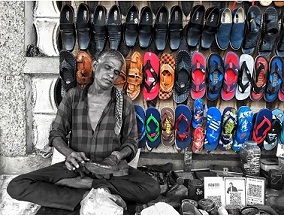
Courtesy: Swaddle/AnubhutiMatta
Dhoomil
(Translated from Hindi by Alok Bhalla)
He chuckled quietly
as he looked up from his tools.
His eyes examined me
for a moment
then he said gently —
‘To tell you the truth,Babuji,
as I see it
there is no one
either too important
or too insignificant.
Each one who stands before me
is a pair of shoes that
needs to be stitched.
These days the reality is
that no matter what he does
who he is, where he lives
no man is greater
than the size of his shoes.
But even then
I can’t help but think that
somewhere or the other
between these hands that work
and the shoes that must be repaired
there is a man
who needs to be healed —
who endures the pain
of his toes peeping out of his shoes
like the blow of a hammer
to his heart.
There are all kinds of shoes here.
They reveal the unique
the distinctive character of each man.
Every shoe has its own shape
its own separate style.
Take this shoe for example:
More than a shoe — it is a bag full of signs.
The man who wears it
is disfigured by chicken pox
but is full of laughter
and hope flutters on his face
like a kite, entangled
in telephone wires.
I want to tell him, “Babuji,
why do you want to waste money on this?”
But I hesitate because I hear
an inner voice tell me, “Hey,
what kind of man
spits on his own jatti?”
Believe me, at that time,
instead of patches,
I seem to stitch
eyes on his shoes
and perform the task
of my profession
with great difficulty.
Here is another shoe
that pinches the man who owns it
when he steps out for a walk.
He wears a wristwatch
but is not pressed for time.
He doesn’t have to go anywhere.
He is not very intelligent.
His eyes are filled withgreed.
He is either a baniya
or a peddler.
He speaks arrogantly
as if he is Hitler’s relative:
“Tie this, cut that, hammer here, chisel there,
scrub the shoe hard
till it shines like a mirror…
Uff! It’s very hot.”
He fans himself with a handkerchif
curses the season and the weather.
Like a monkey
he stares at every woman who walks by
.
But, what is amazing is that
after blustering and bragging for an hour
when it comes to paying for the work
he snarls, “What!
you want to rob and cheat
decent people?”
And then,as he walks away,
he tosses some coins.
He suddenly screams with pain
and hobbles off the street
on to the pavement!
When someone
tries to swindle a worker,
a nail, hidden like a thief,
suddenly emerges
and stabs the toe!
But, I am under no illusions.
I never fail toremind myself
that somewhere between
ashoeand a profession
there is a man
who needs to be “repaired”,
who endures the pain
of his toes sticking out of his shoes
like the blow of a hammer
on his heart.
And, Babuji! The truth is
that without a genuine
purpose in life
there is no difference between
a man who chants Rama’s name
to make a living
and the one who is a tout.
This is one place
where every man
forgets what work he does
and becomes a speck in the crowd.
Like any other man
language wounds him and
changing seasons trouble him.
Consider, for example, this spring day.
It stretches the morning
across the sky
like ataut tent and decorates it
with thousands of bouquets
of deep red leaves on trees
to slowly mature in the sun.
At this time—I swear —
it becomes difficult
to hold a hammer because
the eye is distracted
the hand fails to obey
the mind
like a spoilt child
refuses to concentrate on work
and it seems as if hidden beneath
the calm surface of leather
is a forestof dense trees
tempting us human beings.
Don’t be startled. Think seriously.
Anyone who lives by the book
and panics when he has to face
life’s bloody reality and experiences,
can easily say, “Yaar!
You are not a cobbler, but a poet!”
Actually, he is the victim
of a strange misconception
because he believes that
work belongs to one’s jatti
and that jatti, not the individual,
controls language.
The fact, however, is that
flames singe everybody and
truth brushes past all of us.
There are some who find the right language
others stand blindly before words.
Afraid of the fire of hunger in their belly
they suffer every injustice quietly.
Whereas I know
that‘to scream in protest’or
‘to remain discretely silent’
mean the same and both
— ‘silence’ and ‘scream’ —
in their own ways
dig a foundation for the future.
*******
Sudama Pandey "Dhoomil" (सुदामापांडेय 'धूमिल') (November 9, 1936 – February 10, 1975), most commonly called Dhoomil, was a Hindi poet from Varanasi, known for his revolutionary writings and his "protest-poetry", along with Muktibodh.Known as the angry young man of Hindi poetry because of his rebellious writings, during his lifetime, he published just one collection of poems, Sansad se SarakTak, संसदसेसड़कतक (From the Parliament to the Street), but another collection of his work, entitled KalSunnaMujheकलसुननामुझे, was released posthumously, and in 1979 went on to win the SahityaAkademi Award in Hindi.
Alok Bhalla is a literary critic and essayist, poet, translator and editor based in New Delhi, India.

Leave a Reply